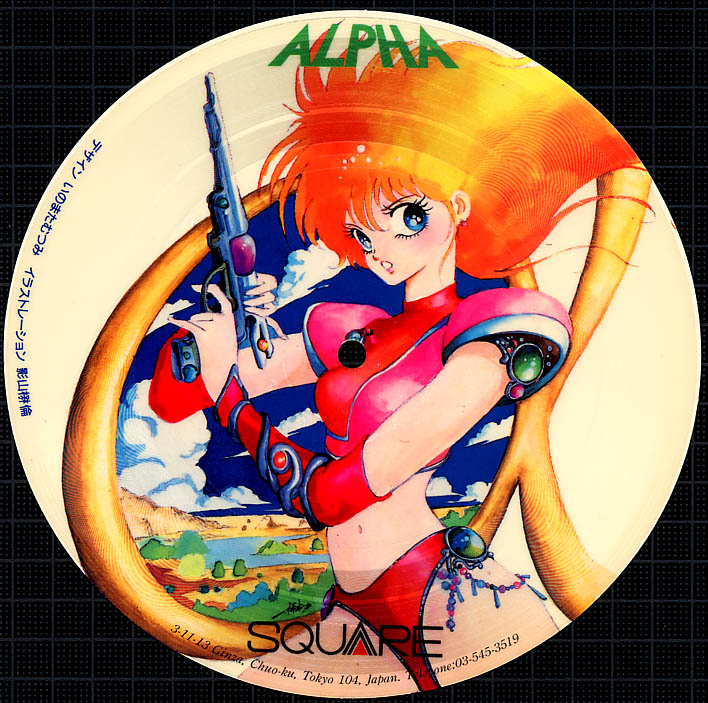Alpha is this bizarre piece of Square history where “if you know, you know” applies. Originally released in 1986, it’s a text-based sci-fi adventure game set in the far future of 2101 A.D. It envisions humanity’s future amongst the stars, heading for a fabled new home world of “Alpha.” Never released outside of Japan, there’s a reason few people worldwide know about this strange title. (And, at this point, it’s so archaic and clunky it’s not worth pursuing.) The racy eroge branding applied to its categorization over a few moments with sexual overtones likely contributed to its limited release. So, when looking back at this game and its soundtrack, you’re bound to stumble across a lot of “Nobuo Uematsu made music for a porn game,” which is far from the truth.
Alpha may star the scantily clad Chris, but the eroge moments are no more egregious than some Final Fantasy boss battles (looking at you, Mellusion/Melusine) coupled with subtext that has been alluded to in other games more overtly. But it’s all about when it released. Shocking enough, a promotional vinyl box set was released in 1987 featuring two tracks to showcase Uematsu’s fourth game soundtrack. As seemingly challenging as the game is, alongside the mixed reception, his work stood out enough to warrant a longstanding relationship with Square, a fact game music fans everywhere are grateful for.
With only two songs sourced for this album, “Prologue ~Theme from ‘α'” suitably sets the stage. The recording features a voiceover off the top that sounds like a radio drama, establishing the game’s plot in English and giving listeners a decent amount of context for the game’s tone. Beneath the woman’s words are suitably ethereal synth chords and percussion, supporting the prologue story with an overture of hope and wistfulness before it drifts away and transitions into the title theme. What follows is a very 1980s sound from the melody, with a clear, soaring synth over a run of notes that glisten, ramping up the tempo before an electro-rock sound takes over. This chunky, electric synth guitar sound gives an almost cyberpunk vibe to the track, adding danger and edge to the coming adventure, further exemplified by the hard, thumping percussion. But it doesn’t last long as the softer synths return, carrying listeners to hopeful heights of a grand adventure ahead.
One can’t help but hear similarities to The NeverEnding Story and almost envision Bastion riding Falcore, but that may be nostalgia talking. More relevant to Uematsu’s story and discography is this bears some hallmarks of the sweeping, magical themes that players would one day hear in the Final Fantasy overworld a year later. The beautiful blend of that electric synth guitar and percussion underscoring the digital solo flute with crystalline ornamentations feels very on-brand for the fantastical soundscapes you expect from him. He crafts a rousing theme, arguably better than this game deserves, setting up a scope that Alpha’s gameplay fails to capture despite the story’s twists and turns. That uplifting melody gets a refrain before slowing down in the final twenty-five seconds or so as Uematsu throws in a playful, almost Baroque-esque ornamentation to tickle the eardrums in a moment of reflection before kicking up the tempo a final time to run listeners to the end.
Then, after a brief pause and that telltale crackle of the vinyl recording, we move into “CHRIS.” Titled after the game’s protagonist, Uematsu attempts to distill the character of Alpha’s heroine into an under two-minute theme. He does so with aplomb, bringing a lot of heart to this piece. His continuous use of haunting synth flute and reverb is suitably “spacey,” sounding like whalesong. Alongside the solitary string, Uematsu builds the melody that breaks in at thirty seconds with the rest of the instrumentation for a full, heartfelt, reflective theme that wouldn’t feel out of place in Bladerunner, much less Final Fantasy IV.
Again, little magical bits of ornamentation (like at the forty-five-second mark) dot the piece, adding some playfulness that feels quite fantasy in its instrumentation. And though it’s symptomatic of the pressing at the time, the distorted warble of the vinyl brings a particular texture that amplifies the science fiction of the mournful synth flute notes. The song ends just shy of resolving on the opening note, clearly intending to loop but instead leaving listeners unsatisfied, if in a good way. It’s like Chris is left wanting more by the piece’s finale, similar to how she wonders as to her place and purpose in Alpha until it is all revealed by the game’s end. Interestingly, the track never plays in the game, as successful completion of the story brings a reprise of the rocking title theme, and there’s no “game over,” so to speak (but you can definitely hard lock the story!) Uematsu possibly made this track simply for promotional purposes, and with only a handful of “Let’s Plays” in the wild for Alpha, it’s hard to say. Regardless, it’s a gorgeous little piece of music that tells us much about who Chris is.
Despite what people may think about the game, which is primarily silent aside from sound effects punctuating story beats, the tracks Uematsu penned for Alpha are beautiful compositions that showcase his early compositional prowess. And that he makes dope soundscapes on the synthesizer. Taking time to listen to this piece of gaming music history from his catalog is still worthwhile. It showcases his understanding of the art and how deftly he crafts the tone and character of a game’s world and story through music, regardless of the nature of said game. You hear the foundations of his ability to make strong themes that catch the ear, which becomes integral to the rest of his work with Square Enix. So, while Alpha belongs in the vaults, this brief vinyl collection for the soundtrack has a lot to tell us about Uematsu’s early days as a composer.





